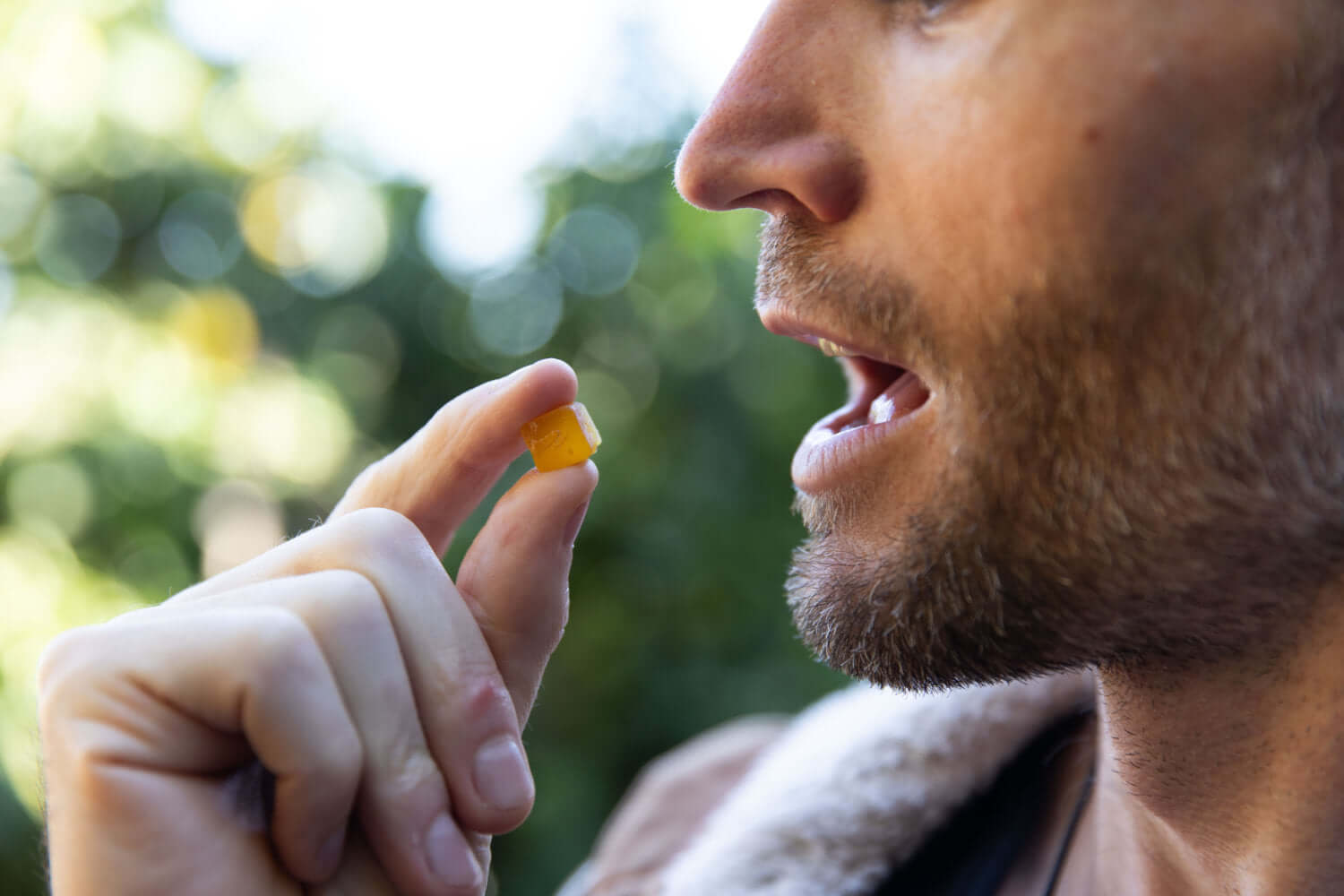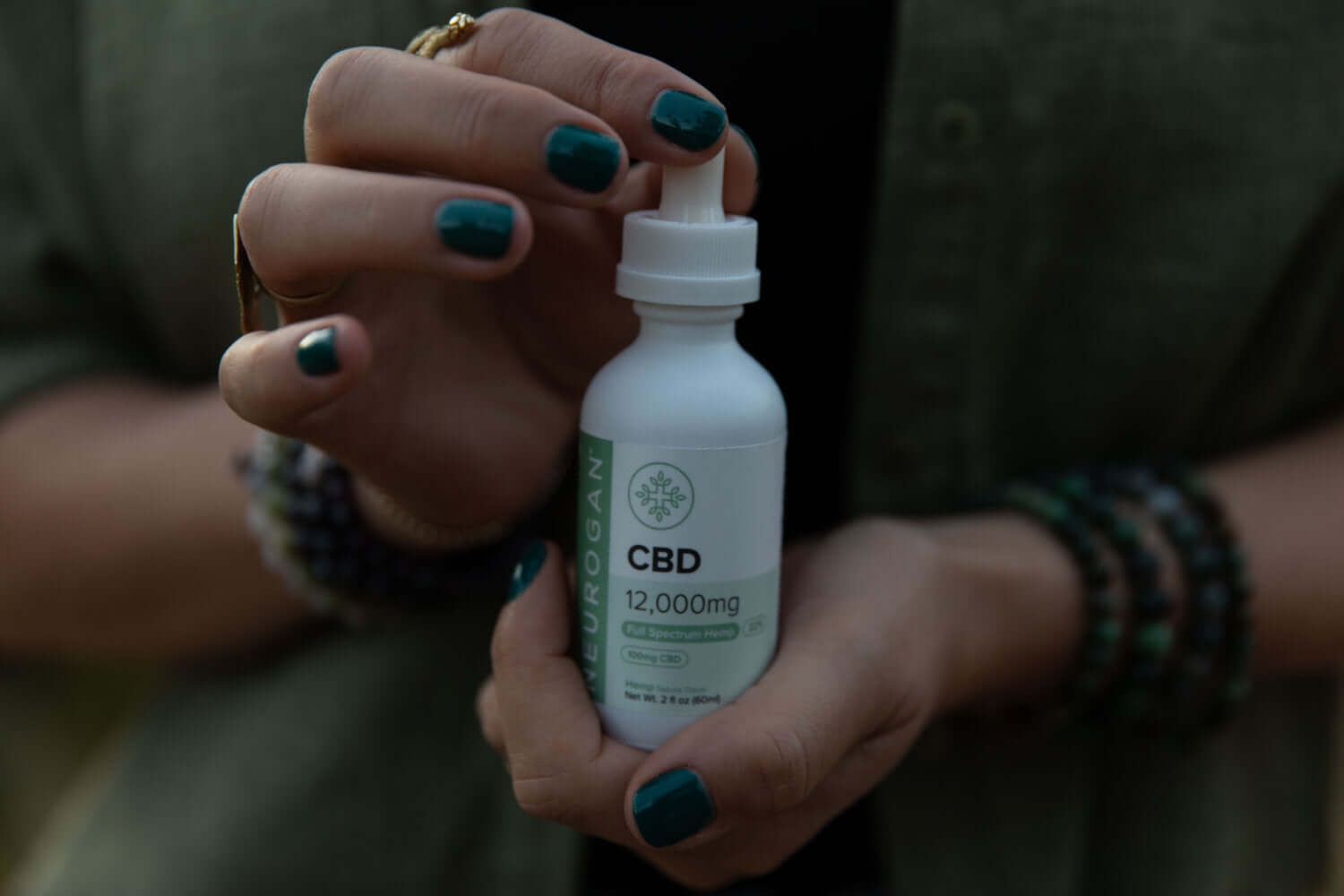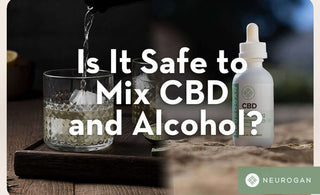Mixing CBD and alcohol is generally considered safe for most people when done in moderation. Both CBD and alcohol are known to help you relax, which is why many people enjoy using them together. But be careful, their effects may become amplified when combined in larger quantities, leaving you feeling drowsy or impaired.
Although research on the safety of this combo is ongoing, some studies suggest that CBD may help counter some of alcohol’s harsh effects [1]. So, what happens when you mix the two?
Is It Safe to Take CBD and Alcohol Together?
Most people can safely mix small amounts of alcohol and CBD, but consuming the two substances together in high doses is not recommended. Both CBD and alcohol can make you feel sleepy. When combined, these effects may be amplified, increasing your risk of potential safety risks, including:
- Accidents and injuries from impaired movement and reaction times, especially during activities like driving or operating machinery.
- Memory lapses and difficulty concentrating affect judgment and decision-making.
- Lowered blood pressure due to combined effects on the circulatory system, potentially causing lightheadedness and fainting.
Due to the overall lack of research on the safety of mixing alcohol and CBD, it’s best to avoid it altogether, especially if you have underlying health conditions or take medications.
On the other hand, if you’re an experienced CBD user, mixing CBD and alcohol might be safe in small doses. Many people find that taking both enhances their relaxing effects, making CBD-infused drinks a great way to unwind on the occasional weekend.
CBD oil tends to mix well with alcoholic drinks because alcohol is a binding agent for CBD, so you won’t get a layer of oil floating on top like you might with a mocktail or cup of herbal tea.
Before you mix up your calming cocktail, remember that everyone’s experience with CBD is different. If you're new to using CBD, try it on its own first to see how your body responds. It’s also worth understanding how CBD and alcohol interact in the body.

Cannabidiol and Alcohol: How They Work Together
Both CBD and alcohol affect the central nervous system (CNS), promoting a sense of calm and relaxation. While researchers are still exploring exactly how these substances work together, the FDA warns that mixing the two increases the risk of drowsiness and sedation.
Interestingly, some studies suggest the relationship between CBD and alcohol may be more complicated than it seems. One study found that taking CBD with alcohol led to significant motor impairment but also reduced blood alcohol levels compared to alcohol alone [2].
Some studies even suggest that CBD might protect against the harmful effects of alcohol, including liver and brain damage [1]. At the same time, there is some evidence that excessive alcohol use may change how CBD works in the body, potentially reducing its benefits [3].
There are both risks and potential benefits of mixing CBD and alcohol. To better understand how these compounds interact, let’s examine how each substance influences the body independently.
Blood Alcohol Levels & Effects On The Body
Alcohol is absorbed into the bloodstream via the digestive system, where it’s broken down by the liver and eliminated from the body. When you drink more than your liver can handle, alcohol builds up in your blood. As blood alcohol levels rise, so do its physical and mental effects, such as intoxication, drowsiness, and impaired judgment and movement.
Alcohol works by depressing the CNS, meaning it slows some of your important brain functions and promotes relaxation. It also activates reward pathways in the brain, which is why many people find drinking enjoyable — and sometimes addictive.
The irony is that chronic alcohol use can alter neurotransmitter levels in the brain, worsening feelings of irritability and anxiety during withdrawal [4]. Could the calming effects of CBD help with hangover-related anxiety? We’ll dive into this question a little later, but first, let’s look at how CBD works in the body.
How Does CBD Interact With The Body?
CBD works by interacting with the body’s endocannabinoid system (ECS), a complex network that regulates many bodily processes, including our stress response, sleep-wake cycle, mood, and metabolism.
The ECS plays a key role in helping the body maintain a state of balance. This is why CBD is often associated with calming effects [5]. CBD has also been shown to interact with specific pain-receptor sites to inhibit pain signals, relax tense muscles, and increase overall comfort [6].
Since alcohol also affects mood, relaxation, pain, and the various other processes managed by the nervous system, mixing it with CBD might prevent you from experiencing the full benefits of the cannabinoid.
Taking CBD for Alcohol-Related Damage
CBD has shown promise for reducing damage caused by alcohol, particularly to the liver and brain. Animal studies suggest that CBD could reduce certain effects of chronic drinking, such as neurodegeneration and its associated behavioral and cognitive impairments [7]. Other studies show that CBD could blunt some of the inflammatory effects of alcohol and reduce alcohol-related liver damage [8].
Researchers have also explored the potential therapeutic properties of CBD for managing alcohol use disorder. In animal studies, for example, CBD tends to reduce alcohol cravings, alcohol intake, and relapse [9].
Given CBD’s potential to help with inflammation, brain function, and liver health, it’s currently being explored as a harm-reduction tool to combat the effects of excessive drinking. While the full extent of CBD’s benefits for humans is still being studied, early findings suggest that CBD may offer some valuable protective properties in minimizing alcohol-related health issues.
Does CBD Work for Hangovers?
Many people use CBD to help with hangovers, thanks to its support of the endocannabinoid system, which also manages feelings of nausea, nervousness, and discomfort. While common hangover cures like drinking pickle juice or eating blue cheese are more myth than science, there is some research to support the use of CBD for handling hangover symptoms.
For instance, plenty of research shows that CBD can suppress nausea and vomiting [10]. Its natural pain-relieving and anti-inflammatory properties may also help with headaches and migraines [11]. Some people even swear by CBD for easing “hangxiety” after a big night out.
So, when your head is pounding and your stomach aches after a long night of drinking, the right CBD product might just offer some relief.
Choosing the Best CBD Product for Hangovers
The CBD product you choose for your hangover will come down to personal preference. The only products that won't help with hangover symptoms are topicals — these are intended for localized relief.
For the fastest-acting effects, smoking or vaping CBD is the answer. When you inhale CBD, cannabinoids can enter the bloodstream quickly via the oxygen exchange in your lungs.
If you’re taking CBD oils or tinctures, pay attention to the extract type of your product. These are your two main options:
- Full Spectrum CBD: Contains all the active compounds naturally found in the hemp plant. This gold-standard form of CBD supports a wide range of lifestyle needs and is a top choice for finding relief from discomfort, like in the aftermath of a big night out.
- Broad Spectrum CBD: Contains all of the cannabinoids in hemp except for THC. These extracts are the next best option after full-spectrum oils and are ideal if you need something that’s 100% THC-free.

Many people find that trace amounts of THC help support and enhance the effects of CBD without producing psychoactive effects. Unless you need to avoid THC, full spectrum extracts may be the best defense against hangover discomfort.
Mixing CBD And Alcohol
For most people, mixing alcohol and CBD is generally safe as long as doses of both substances are low. If you’re going to drink a lot, it may be best to avoid taking CBD at the same time.
Both CBD and alcohol can induce relaxation and lower inhibitions, which is why many people enjoy using these substances together. However, their effects may amplify when mixed, possibly leading to significant drowsiness and motor impairment.
That said, there may be some benefits of taking CBD while drinking. Some interesting research shows that CBD may reduce blood alcohol levels and diminish some of the oxidative damage and inflammation caused by alcohol. At the same time, anecdotal reports suggest that CBD could also help you deal with a nasty hangover.
The most important takeaway here is to be cautious when combining CBD and alcohol, especially if you’re going to be engaging in activities that require focus, coordination, or good judgment.
Another important note: Don’t rely on CBD as a treatment for alcohol abuse. If you're suffering from addiction, we strongly recommend seeking advice from your doctor to support you in coming off of alcohol safely. Alcohol abuse is a serious disease, and some of the consequences of alcohol withdrawal syndrome can be life-threatening.
FAQ
What Are The Effects of Mixing CBD and Alcohol?
The most common effects of mixing CBD and alcohol include increased relaxation, drowsiness, and impaired cognitive function. These effects can make it difficult to perform tasks that require your focus or concentration and can even be dangerous in some situations.
That said, most people should be fine mixing alcohol and CBD in moderation. Some intriguing evidence indicates that CBD could even lower blood alcohol levels and mitigate some alcohol-related damage to the liver and brain.
Is It Safe To Mix CBD and Alcohol?
Drinking alcohol while using CBD oil can put you at risk of injury and severe hangovers. If you’re going to mix CBD and alcohol, stick with small doses of each and consume in moderation to avoid potentially dangerous side effects.
It’s also important to remember that everyone’s CBD experience is unique. If you’re taking CBD for the first time, it’s best to avoid alcohol so you can see how you respond. This will make it much easier to see how CBD benefits your body and help you find your perfect dose.
Are CBD Drinks Better Than Alcohol?
CBD drinks are seen as a safer alternative to alcohol due to their non-intoxicating nature, lack of cognitive impairment, and potential health benefits. They offer relaxation and stress relief without the negative side effects associated with alcohol consumption.
Can THC Help With Alcohol Withdrawal?
While THC may have some potential to alleviate certain symptoms of alcohol withdrawal, its use for this purpose is not recommended due to the complex interactions between THC and the brain during withdrawal. THC's psychoactive effects may further complicate the withdrawal process, leading to potential dependency issues.
Can You Use CBD For Alcohol Hangovers?
CBD may help with hangover symptoms like headaches, inflammation, nausea, and vomiting, but it can also cause side effects like nausea and fatigue in some users. The best approach to recovering from a hangover is to hydrate, rest, and eat a nutritious meal.
Resources:
- Balachandran, P., Elsohly, M., & Hill, K. P. (2021). Cannabidiol interactions with medications, illicit substances, and alcohol: a comprehensive review. Journal of general internal medicine, 36(7), 2074-2084.
- Consroe, P., Carlini, E. A., Zwicker, A. P., & Lacerda, L. A. (1979). Interaction of cannabidiol and alcohol in humans. Psychopharmacology, 66(1), 45-50.
- Wolfe, S. A., Vozella, V., & Roberto, M. (2022). The synaptic interactions of alcohol and the endogenous cannabinoid system. Alcohol research: current reviews, 42(1), 03.
- Banerjee, N. (2014). Neurotransmitters in alcoholism: A review of neurobiological and genetic studies. Indian journal of human genetics, 20(1), 20.
- Peng, J., Fan, M., An, C., Ni, F., Huang, W., & Luo, J. (2022). A narrative review of molecular mechanism and therapeutic effect of cannabidiol (CBD). Basic & clinical pharmacology & toxicology, 130(4), 439-456.
- Russo, E. B. (2008). Cannabinoids in the management of difficult to treat pain. Therapeutics and clinical risk management, 4(1), 245.
- Liput, D. J., Hammell, D. C., Stinchcomb, A. L., & Nixon, K. (2013). Transdermal delivery of cannabidiol attenuates binge alcohol-induced neurodegeneration in a rodent model of an alcohol use disorder. Pharmacology Biochemistry and Behavior, 111, 120-127.
- Chung, T., & Harris, R. A. (2019). Cannabis and alcohol: from basic science to public policy. Alcoholism, clinical and experimental research, 43(9), 1829.
- De Ternay, J., Naassila, M., Nourredine, M., Louvet, A., Bailly, F., Sescousse, G., ... & Rolland, B. (2019). Therapeutic prospects of cannabidiol for alcohol use disorder and alcohol-related damages on the liver and the brain. Frontiers in pharmacology, 10, 627.
- Parker, L. A., Rock, E. M., & Limebeer, C. L. (2011). Regulation of nausea and vomiting by cannabinoids. British journal of pharmacology, 163(7), 1411-1422.
- Greco, R., Francavilla, M., Demartini, C., Zanaboni, A. M., Sodergren, M. H., Facchetti, S., ... & Tassorelli, C. (2023). Characterization of the biochemical and behavioral effects of cannabidiol: implications for migraine. The journal of headache and pain, 24(1), 48.


